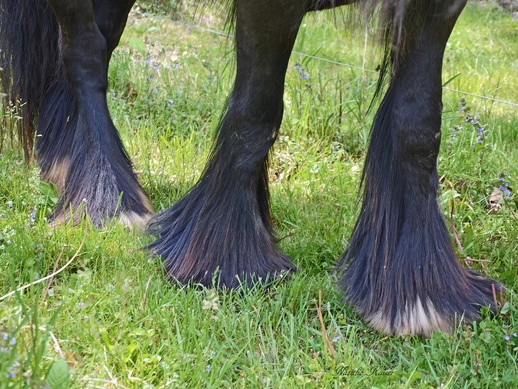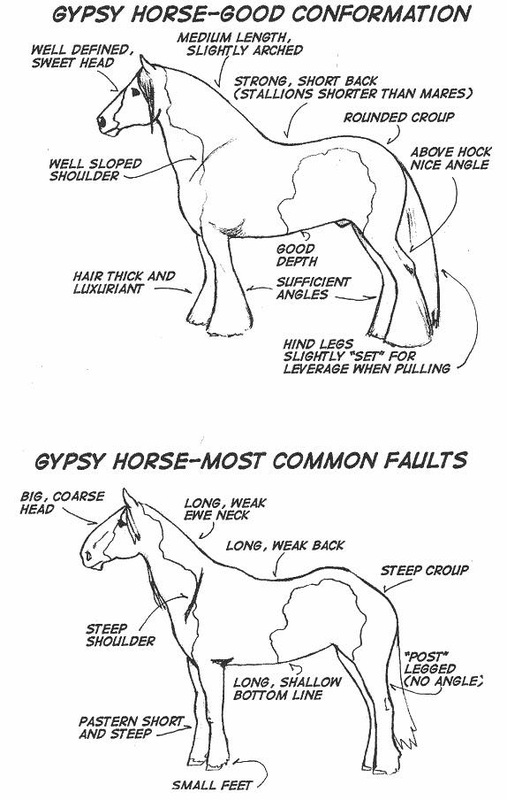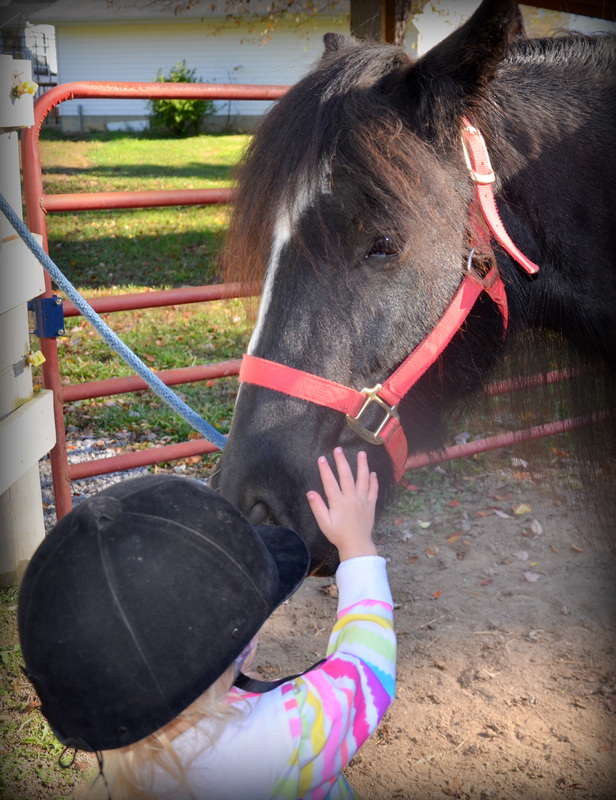About the Gypsy
|
TemperamentWe must also incorporate factors of health and soundness as well as temperament when we look at the overall value of a horse to our breeding program and the job it will be given. The Gypsy is well known for its hair and flashy colors, but they are also sought after for their docile disposition.
Every horse is different. Some have more personality than others and that can be something people really like to have in their horse. It can create a more interesting life and relationship between owner and horse. However, some people really want a horse that is quiet and predictable, perhaps as a child's horse. Both are acceptable as long as the horse is good-natured. It is important to consider nature vs. nurture in the consideration of temperament. It is reasonable to see how both can influence the outcome of a horse's temperament. |
Health

A correct Gypsy Horse is generally a pretty sound animal. They have thick hoof walls and good bone creating a solid foundation and few lameness issues. Most are easy keepers if they are not being bred or worked to extremes. However, there are a few things to consider before you buy or breed your Gypsy.
The hair makes the whole look on these horses. Lets be honest, without all that hair they would just be another draft breed that didn't really stand out. That's all well and good, but hair comes with a lot of maintenance or it can contribute to serious health issues. The skin under all that hair needs to be watched carefully, washed often and kept dry. If persistent infection lingers there it can cause pastern dermatitis. Please keep in mind that ALL Gypsy horses are prone to skin issues under their feather and ALL will have some sort of dermatitis on the legs at some point in their lives. How much and how bad is dependent on how clean and dry the skin and feather are kept.
A serious condition to watch for in Gypsies is called Chronic Progressive Lymphedema (CPL). CPL is an extreme that is rare in properly cared for horses, yet some horses are more prone to this disease than others. CPL happens when the lymphatic system is not functioning properly and is brought on or made worse by infections on the skin of the legs. This disease can affect any draft breed.
Something else that has recently been discovered in Gypsies via the genetic test is PSSM1 or EPSM, these are two different abbreviations for the same disease. You may see many Gypsies advertised as PSSM clear or n/P1, etc. This is the same test used on stock horses, but Gypsies do not have the same symptoms as typical stock horses. In fact many would argue that Gypsies have NO symptoms at all. At the end of the day you need to do your own research on the subject and come to your own conclusion. Some breeders will not acknowledge the presence of the genetic marker at all, others test for it and breed n/P1 horses only to clear horses and yet others have removed it entirely from their herds. At this point not enough is known to say it is bad and everyone agrees not to cull the entire population of PSSM positive horses. However, we believe all breeding stock should be tested and PSSM horses should not be bred to PSSM horses.
Below are a few links with more information:
https://www.ruralheritage.com/vet_clinic/epsm.htm
http://www.animalgenetics.us/Equine/Genetic_Disease/PSSM.asp
The hair makes the whole look on these horses. Lets be honest, without all that hair they would just be another draft breed that didn't really stand out. That's all well and good, but hair comes with a lot of maintenance or it can contribute to serious health issues. The skin under all that hair needs to be watched carefully, washed often and kept dry. If persistent infection lingers there it can cause pastern dermatitis. Please keep in mind that ALL Gypsy horses are prone to skin issues under their feather and ALL will have some sort of dermatitis on the legs at some point in their lives. How much and how bad is dependent on how clean and dry the skin and feather are kept.
A serious condition to watch for in Gypsies is called Chronic Progressive Lymphedema (CPL). CPL is an extreme that is rare in properly cared for horses, yet some horses are more prone to this disease than others. CPL happens when the lymphatic system is not functioning properly and is brought on or made worse by infections on the skin of the legs. This disease can affect any draft breed.
Something else that has recently been discovered in Gypsies via the genetic test is PSSM1 or EPSM, these are two different abbreviations for the same disease. You may see many Gypsies advertised as PSSM clear or n/P1, etc. This is the same test used on stock horses, but Gypsies do not have the same symptoms as typical stock horses. In fact many would argue that Gypsies have NO symptoms at all. At the end of the day you need to do your own research on the subject and come to your own conclusion. Some breeders will not acknowledge the presence of the genetic marker at all, others test for it and breed n/P1 horses only to clear horses and yet others have removed it entirely from their herds. At this point not enough is known to say it is bad and everyone agrees not to cull the entire population of PSSM positive horses. However, we believe all breeding stock should be tested and PSSM horses should not be bred to PSSM horses.
Below are a few links with more information:
https://www.ruralheritage.com/vet_clinic/epsm.htm
http://www.animalgenetics.us/Equine/Genetic_Disease/PSSM.asp


